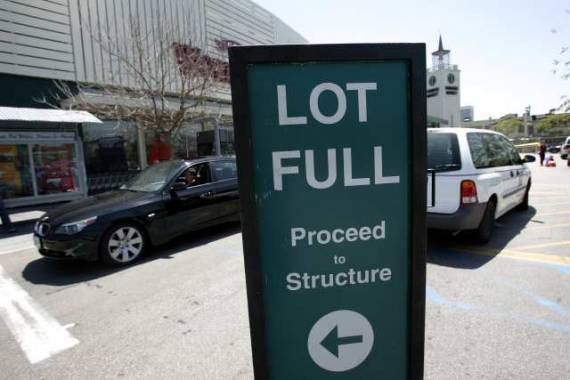
Later today, behind closed doors, the Los Angeles City Council will meet to debate and discuss whether to put out to bid a plan to lease all of the city controlled parking lots throughout the city for fifty years. The debate over whether the city should proceed has been almost completely centered around whether or not the cost to residents and businesses of increasing parking costs will be worth the fiduciary benefit to city coffers.
Mayor Antonio Villaraigosa has written the City Council urging the Members to allow the city to solicit bids to lease the lots for fifty years or else the city would be forced to layoff and/or furlough more civil employees. He cites a report by the City Administrative Officer and Chief Legislative Analyst that basically says that the Council has a choice between approving a "public-private partnership" to lease the lots or being responsible for scores of furloughs. His position is further boosted by editorials that appear in today's Los Angeles Times and Los Angeles Daily News urging a quick sale of city lots.
Nobody is debating whether or not the city is in a dire financial state, but rather whether a plan to basically privatize a public resource is a good idea. Below are 4 questions that the Council needs to know the answers to if they're serious analyzing the proposal and not just being a rubber stamp.
The best known parking lease plan in America was the leasing of metered and street parking spaces in Chicago. To put it mildly, Chicago got fleeced. Morgan Stanley has raised parking rates and already recouped their initial investment. The next seventy three years of their lease will be pure profit. Children not even born will have grandchildren paying for this sweetheart deal because the Chicago politicians were too scared to raise meter rates on their own.
Thus, the first question should be: How does Los Angeles avoid becoming the next Chicago?
And let's be honest, a closed-door discussion of the issue doesn't inspire confidence that our city's leaders are confident they can get the best deal from a parking agency.
Business groups in Hollywood, Westwood and the Downtown have fought the privatization plan, but they're basically doing so because they believe that subsidized parking is key to local business models. Drivers and businesses basically went on the warpath after the city raised meter rates and installed smart meters in 2009. City Watch will never be happy with any deal that gives the city more money.
But here's the rub. Those people are basically arguing for a subsidy for parking their car. If the city believes a private operator can make enough profits to temporarily fix the city's budget, it means that it believes that the operators are going to do so by raising the rates. In other words, the city hasn't been pricing its spaces at market value and has been subsidizing the cost of parking in city owned garages.
So here's the second question: Rather than outsourcing profits, why doesn't the city just raise the rates at these garages?
In today's editorial, the Daily News basically calls advocates of market rate parking who believe the Council has the guts to do this their own dayreamers:
And those who think the City Council will on its own make the financially responsible but politically difficult choice of raising rates and ending parking subsidies have their heads in the sand. The council has consistently balked at making hard choices for the good of many when confronted by the protests of the few.
But outsourcing the political will to adjust parking costs to meet the market rate did not shield Chicago pols from public outrage when rates went up and the profits went to Morgan Stanley instead of the City of Chicago. That the beneficiaries of subsidized parking won't get mad at the city when rates go up have their heads in the same theoretical sand.
If the city believes these garages aren't something that can raise revenue, and believes that they are going to fleece the private operator; that means these garages are a bad use of public spaces. Land is one of the most valuable resources in the city, and if we're wasting some of it on parking, and the city doesn't mind losing control of the land, our next question is obvious.
Why aren't we looking at just selling the land outright? If someone wants to operate a parking lot, fine. If someone wants to use the land for something else, why not?
And here's the last question, and one that's been so ignored that the leasing plan hasn't even been heard by the City Council Transportation Committee. What impact will leasing these garages have on local traffic circulation and any long-term reforms that future mayors or Councils might want to implement?
Nobody is discussing this, other than the below-market rate advocates who worry the increased rates will drive away business. A study by LADOT or some other parking expert, should be a prerequisite before any city makes a plan to lease their public parking.





